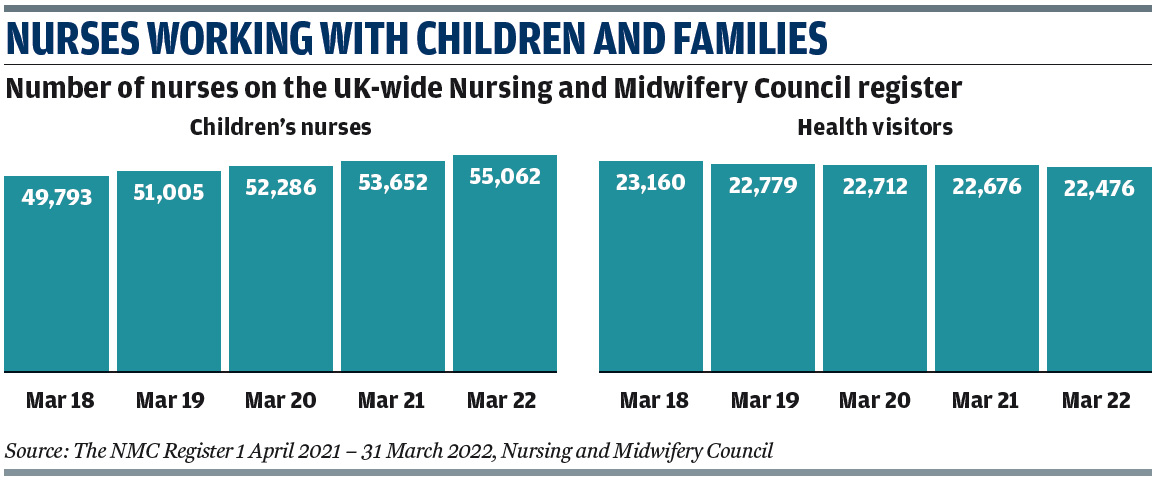
There are ongoing concerns about staffing in health services due to Covid-related sickness absence, long-standing vacancies and a backlog in care. Shortages in the UK’s 30 paediatric intensive care units are so severe that healthcare assistants are covering the work of nurses, according to the Paediatric Intensive Care Audit Network.
In May 2022, NHS England sent a letter to all NHS Trusts setting out plans to recruit and retain staff to tackle the Covid-19 backlog. These included encouraging recently retired staff to return and persuading staff and volunteers involved in the Covid vaccination programme to join the NHS on a longer-term basis.
NHS England has launched a Nursing International Recruitment Programme to develop the NHS as the “destination of choice” for internationally trained nurses, and a Refugee Nurse Support Pilot Programme to support refugee nurses who want to work for the NHS.
Nursing and midwifery
The number of registered nurses, midwives and nursing associates in the UK increased by 26,403 this year, according to the Nursing and Midwifery Council (NMC). However, the number leaving the register has also risen by 3,199 after falling in recent years. Applications for UK nursing courses have fallen by eight per cent from last year’s record high, although they are still up 9.5 per cent from 2020 and 28 per cent from 2019. The number of children’s nurses has risen to a new high of 55,062, and the number of school nurses has increased by 173, to 4,047 in 2022. Routes into nursing include the nursing degree apprenticeship and the nursing associate role.
In July 2022, the NMC launched standards for the education of specialist roles including health visitors, community children’s nurses and school nurses, with a new focus on issues such as promoting the rights of school-age children and young people. Students starting courses after 31 August 2024 must be registered on the new programme.
Health Education England has launched a blended learning degree in midwifery. Students gain practical experience close to home, with other aspects of training delivered remotely.

Health visitors
In England, the number of full-time equivalent health visitors continues to fall, standing at 6,156 as of February 2022 – a 40 per cent drop since 2015. In December 2021, an Institute of Health Visiting survey found an estimated shortfall of 5,000 health visitors has left the remaining workforce with unmanageable workloads.
In its Start for Life review into early years health the government said it would work with partners to promote health visiting as a career. However, a £302m investment in the Family Hubs and Start for Life programme contains no funding for health visiting services. The funding, which includes £10m to test “innovative Start for Life workforce models”, will be shared between 75 local authorities to provide services including perinatal mental health support.
Mental health
There are ongoing concerns about children and young people’s mental health with 1.025 million referrals of under-18s to specialist mental health services in England in 2021. There are 15,486 people working in the children and young people’s mental health workforce and 1,642 vacancies, according to the NHS. Three quarters are employed by the NHS, 11 per cent by the independent sector and the rest by the voluntary sector, local authorities and youth offending teams.
The NHS has sped up the roll out of its mental health support team (MHST) programme and aims to have more than 500 mental health support teams supporting schools in England by 2024. In 2021/22, 112 teams began training and 104 will start during 2022/23.
MHSTs usually include four education mental health practitioners (EMHPs), who assess and support children and young people with mental health difficulties such as mild to moderate anxiety. The role can include advising on sleep, problem solving and panic attacks and promoting approaches to improve emotional health. EMHPs undertake a funded 12-month university course combining academic and theory elements, self-study and work-based placements. An early evaluation of the programme, published in July 2021, found retaining EMHPs was a challenge as the role was seen as a stepping stone to other careers.
The British Psychological Society (BPS) and the British Association for Behavioural and Cognitive Psychotherapies (BABCP) are developing registers for EMHPs and children’s wellbeing practitioners (CWPs) which are set to launch later this year. A CWP offers a range of low-intensity psychological interventions for mild to moderate mood and anxiety disorders and works within a variety of mental health settings, including child and adolescent mental health services (CAMHS). A CWP must complete a HEE-commissioned training course of around 30 to 35 days over an academic year.
A mandatory register for Psychological Wellbeing Practitioners (PWPs) launched in June 2021. A PWP is trained to assess and support people with common mental health problems to manage their own recovery and can specialise in perinatal work. From June 2022, all PWPs working in England within the NHS are required to register with either the BPS or the BABCP.
Schools and colleges can apply for £1,200 to train a senior mental health lead to develop a whole school or college approach to mental health and wellbeing in 2022/23. More than 3,500 senior leads have begun training.
Child and adolescent psychotherapists usually work in CAMHS. Trainee child and adolescent psychotherapists must have completed a recognised pre-clinical course and then undertake a four-year full-time programme including teaching, supervision, personal psychoanalysis and a salaried training post.
Read more in CYP Now's Children’s Workforce Guide to Qualifications and Training

